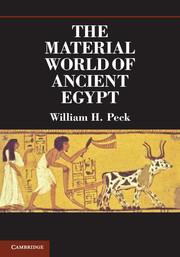Book contents
- Frontmatter
- Contents
- List of Figures
- Preface
- Acknowledgments
- Introduction
- 1 Geography and Geology
- 2 Brief Outline of Egyptian History
- 3 Study of the Material World of Ancient Egypt
- 4 Dress and Personal Adornment
- 5 Housing and Furniture
- 6 Food and Drink
- 7 Hygiene and Medicine
- 8 Containers of Clay and Stone
- 9 Tools and Weapons
- 10 Basketry, Rope, Matting
- 11 Faience and Glass
- 12 Transportation
- 13 Sport and Games
- 14 Music and Dance
- 15 Weapons and Armor
- 16 Conclusions
- Sources of Chapter Heading Quotations
- Bibliography
- Index
1 - Geography and Geology
The Land
Published online by Cambridge University Press: 05 August 2013
- Frontmatter
- Contents
- List of Figures
- Preface
- Acknowledgments
- Introduction
- 1 Geography and Geology
- 2 Brief Outline of Egyptian History
- 3 Study of the Material World of Ancient Egypt
- 4 Dress and Personal Adornment
- 5 Housing and Furniture
- 6 Food and Drink
- 7 Hygiene and Medicine
- 8 Containers of Clay and Stone
- 9 Tools and Weapons
- 10 Basketry, Rope, Matting
- 11 Faience and Glass
- 12 Transportation
- 13 Sport and Games
- 14 Music and Dance
- 15 Weapons and Armor
- 16 Conclusions
- Sources of Chapter Heading Quotations
- Bibliography
- Index
Summary
Generally speaking, we may say that the Nile surpasses all the rivers of the inhabited world in its benefactions to mankind.
Diodorus Siculus“The land of Egypt is the gift of the river,” one of the most often quoted observations about ancient Egypt, was made by Herodotus, the fifth-century BCE Greek historian. It was not an original idea of his, and he may have even borrowed it from another ancient author, but it was a common way in his time to describe the dependence that the country had on the life-giving renewal brought by the annual inundation, or flooding, of the river Nile. His statement also emphasized the fact that the fertile Nile delta had been built up over centuries by the silt carried downstream each year by that flood, and it was fundamentally the delta that the world of the Greeks and Romans knew best.
The landscape of Egypt as seen from space has been compared to a lotus flower on a long stalk, with only one large leaf on one side. In a satellite image the long ribbon of the Nile and the narrow cultivated area along its banks terminates in the fan-shaped delta, the “flower.” The “leaf” is the Fayum depression on the west, with its large lake. Although it is obviously a coincidence, the visual comparison of Egypt to the lotus is an apt one because the ancient Egyptians had a strong belief in the symbolism of the flower as an image of rebirth or resurrection.
- Type
- Chapter
- Information
- The Material World of Ancient Egypt , pp. 9 - 16Publisher: Cambridge University PressPrint publication year: 2013



